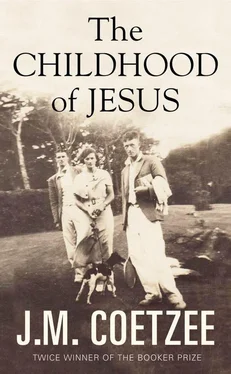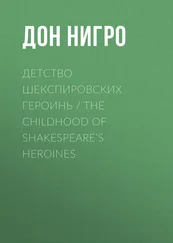He turns and lets the sack of grain fall into the bed of the cart. A young man wearing a battered hat leaps lightly aboard and drags the sack forward. One of the horses drops a load of steaming dung. ‘Out of the way!’ calls out a voice behind him. It is the next of the stevedores, the next of his workmates, with the next sack.
He retraces his steps into the hold, returns with a second load, then a third. He is slower than his mates (they have sometimes to wait for him), but not much slower; he will improve as he gets used to the work and his body toughens. Not too old, after all.
Though he is holding them up, he senses no animus from the other men. On the contrary, they give him a cheery word or two, and a friendly slap on the back. If this is stevedoring, it is not such a bad job. At least one is accomplishing something. At least one is helping to move grain, grain that will be turned into bread, the staff of life.
A whistle blows. ‘Break-time,’ explains the man beside him. ‘If you want to — you know.’
The two of them urinate behind a shed, wash their hands at a tap. ‘Is there someplace one can get a cup of tea?’ he asks. ‘And perhaps something to eat?’
‘Tea?’ says the man. He seems amused. ‘Not that I know of. If you are thirsty you can use my mug; but bring your own tomorrow.’ He fills his mug at the tap, proffers it. ‘Bring a loaf too, or half a loaf. It’s a long day on an empty stomach.’
The break lasts only ten minutes, then the work of unloading resumes. By the time the foreman blows his whistle for the end of the day, he has carried thirty-one sacks out of the hold onto the wharf. In a full day he could carry perhaps fifty. Fifty sacks a day: two tons, more or less. Not a great deal. A crane could move two tons in one go. Why do they not use a crane?
‘A good young man, this son of yours,’ says the foreman. ‘No trouble at all.’ No doubt he calls him a young man, un jovencito , to make him feel good. A good young man who will grow up to be a stevedore too.
‘If you were to bring in a crane,’ he observes, ‘you could get the unloading done in a tenth of the time. Even a small crane.’
‘You could,’ agrees the foreman. ‘But what would be the point? What would be the point of getting things done in a tenth of the time? It is not as if there is an emergency, a food shortage for example.’
What would be the point? It sounds like a genuine question, not a slap in the face. ‘So that we could devote our energies to some better task,’ he suggests.
‘Better than what? Better than supplying our fellow man with bread?’
He shrugs. He should have kept his mouth shut. He is certainly not going to say: Better than lugging heavy loads like beasts of burden .
‘The boy and I need to hurry,’ he says. ‘We must be back at the Centre by six, otherwise we will have to sleep in the open. Shall I come back tomorrow morning?’
‘Of course, of course. You have done well.’
‘And can I get an advance on my pay?’
‘Not possible, I’m afraid. The paymaster doesn’t do his round until Friday. But if you are short of money’ — he burrows into his pocket and comes out with a handful of coins — ‘here, take what you need.’
‘I am not sure what I need. I am new here, I have no idea of prices.’
‘Take it all. You can pay me back on Friday.’
‘Thank you. It is very kind of you.’
It is true. To keep an eye on your jovencito while you work and then to cap it all by lending you money: not what you would expect of a foreman.
‘It’s nothing. You would do the same. Goodbye, young man,’ he says, turning to the boy. ‘See you bright and early in the morning.’
They reach the office just as the woman with the dour face is closing up. Of Ana there is no sign.
‘Any news of our room?’ he asks. ‘Have you found the key?’
The woman frowns. ‘Follow the road, take the first turn right, look for a long, flat building, it is called C Building. Ask for señora Weiss. She will show you your room. And ask señora Weiss whether you can use the laundry room to wash your clothes.’
He picks up the hint and flushes. After a week without a bath the child has begun to smell; no doubt he smells even worse.
He shows her his money. ‘Can you tell me how much is this?’
‘Can’t you count?’
‘I mean, what can I buy with it? Can I buy a meal?’
‘The Centre does not provide meals, only breakfast. But speak to señora Weiss. Explain your situation. She may be able to help you.’
C-41, señora Weiss’s office, is closed and locked as before. But in the basement, in a nook under the stairs lit by a single bare bulb, he comes upon a young man sprawled in a chair reading a magazine. As an addition to the chocolate-coloured Centre uniform the fellow wears a tiny round hat with a strap under the chin, like a performing monkey’s.
‘Good evening,’ he says. ‘I am looking for the elusive señora Weiss. Have you any idea where she is? We have been allocated a room in this building, and she has the key, or at least the master key.’
The young man gets to his feet, clears his throat, and responds. His response is polite but in the end not helpful. If señora Weiss’s office is locked then the señora has probably gone home. As for any master key, if one exists then it is likely to be in the same locked office. Similarly for the key to the laundry room.
‘Can you at least direct us to room C-55?’ he asks. ‘C-55 is the room allocated to us.’
Without a word the young man leads them down a long corridor, past C-49, C-50. . C-54. They reach C-55. He tries the door. It is not locked. ‘Your troubles are over,’ he remarks with a smile, and withdraws.
C-55 is small, windowless, and exceedingly simply furnished: a single bed, a chest of drawers, a washbasin. On the chest of drawers is a tray holding a saucer with two and a half cubes of sugar in it. He gives the sugar to the boy.
‘Do we have to stay here?’ asks the boy.
‘Yes, we have to stay here. It will only be for a short time, while we look for something better.’
At the far end of the corridor he locates a shower cubicle. There is no soap. He undresses the child, undresses himself. Together they stand under a thin stream of tepid water while he does his best to wash them. Then, while the child waits, he holds their underwear under the same stream (which soon turns cool and then cold) and wrings it out. Defiantly naked, with the child beside him, he pads down the bare corridor back to their room and bolts the door. With their one and only towel he dries the boy. ‘Now get into bed,’ he says.
‘I’m hungry,’ complains the boy.
‘Be patient. We will have a big breakfast in the morning, I promise. Think about that.’ He tucks him into bed, gives him a goodnight kiss.
But the boy is not sleepy. ‘What are we here for, Simón?’ he asks quietly.
‘I told you: we are here just for a night or two, till we find a better place to stay.’
‘No, I mean, why are we here ?’ His gesture takes in the room, the Centre, the city of Novilla, everything.
‘You are here to find your mother. I am here to help you.’
‘But after we find her, what are we here for?’
‘I don’t know what to say. We are here for the same reason everyone else is. We have been given a chance to live and we have accepted that chance. It is a great thing, to live. It is the greatest thing of all.’
‘But do we have to live here?’
‘Here as opposed to where? There is nowhere else to be but here. Now close your eyes. It is time to sleep.’
He wakes up in a good mood, full of energy. They have a place to stay, he has a job. It is time to set about the chief task: finding the boy’s mother.
Читать дальше












